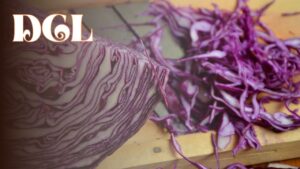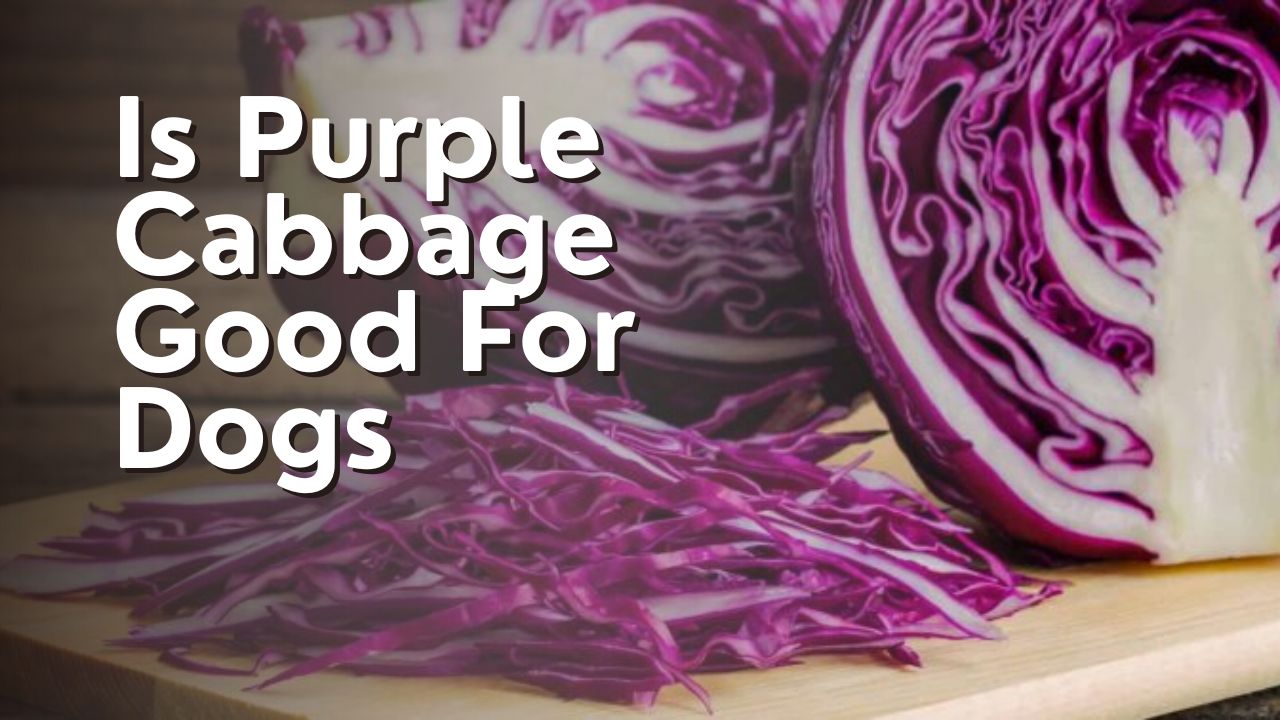Is purple cabbage good for dogs?
As a dog owner, you may be curious about introducing this vibrant vegetable into your furry friend’s diet. In this article, we will explore the nutritional value of purple cabbage for dogs, along with potential risks and precautions to keep in mind.
Additionally, we will discuss how to incorporate purple cabbage into your dog’s meals and the potential benefits it can offer for specific health conditions.
Remember, always consult with a veterinarian before making any dietary changes for your beloved pup.
Nutritional Value of Purple Cabbage for Dogs
Purple cabbage is a good source of essential nutrients for dogs. It is packed with vitamins and minerals that can benefit their overall health. Purple cabbage is rich in vitamin K, which plays a crucial role in blood clotting and bone health. It also contains vitamin C, which is an antioxidant that helps boost the immune system and promote healthy skin. Additionally, purple cabbage is a good source of fiber, which aids digestion and can prevent constipation in dogs.
Not only is purple cabbage nutritious, but it is also low in calories, making it a great addition to a dog’s diet, especially for those watching their weight. However, it is important to note that purple cabbage should be given to dogs in moderation. Too much cabbage can cause digestive upset, such as gas and diarrhea. It is best to introduce purple cabbage gradually into their diet and monitor their reaction.
When feeding purple cabbage to dogs, it is important to prepare it properly. Remove any tough outer leaves and wash the cabbage thoroughly. It can be served raw, shredded, or lightly steamed. Avoid adding any seasoning or dressing, as these can be harmful to dogs.
Overall, purple cabbage can be a healthy and nutritious addition to a dog’s diet when given in moderation. It is important to consult with a veterinarian before making any changes to your dog’s diet to ensure it is suitable for their specific needs.

Potential Risks and Precautions
Be cautious and make sure to take necessary precautions when considering feeding purple cabbage to your furry friend. While purple cabbage does offer some nutritional benefits for dogs, there are also potential risks that need to be considered.
One potential risk of feeding purple cabbage to dogs is the possibility of digestive upset. Some dogs may have sensitive stomachs and may experience gas, bloating, or diarrhea after consuming cabbage. It’s important to introduce purple cabbage slowly into your dog’s diet and monitor for any adverse reactions.
Another potential risk is the presence of pesticides or chemicals on the cabbage. It is crucial to choose organic purple cabbage to minimize the risk of exposure to harmful substances. Washing the cabbage thoroughly before feeding it to your dog can also help remove any residues.
Lastly, purple cabbage should only be given to dogs in moderation. While it contains beneficial nutrients like vitamins K and C, excessive consumption can lead to an upset stomach or even interfere with the absorption of other essential nutrients.
In conclusion, while purple cabbage can be a healthy addition to your dog’s diet, it is important to be cautious and take necessary precautions. Introduce it gradually, choose organic options, and feed it in moderation to ensure your furry friend can safely enjoy the nutritional benefits it offers.
- Potential Risks and Precautions:
- Digestive upset: Some dogs may experience gas, bloating, or diarrhea after consuming purple cabbage.
- Pesticides and chemicals: Choose organic cabbage to minimize the risk of exposure to harmful substances.
- Moderation: Feed purple cabbage in moderation to avoid digestive issues and interference with nutrient absorption.
How to Incorporate Purple Cabbage into Your Dog’s Diet
When it comes to incorporating purple cabbage into my dog’s diet, there are a few key points to keep in mind.
First, I need to consider the cooking methods and preparation techniques to ensure that the cabbage is safe and easy for my dog to digest.
Additionally, mixing the cabbage with other dog-friendly foods can help create a balanced and nutritious meal for my furry friend.
Lastly, I’m excited to try out some homemade treat recipes that include purple cabbage as an ingredient, providing my dog with a tasty and healthy snack option.
Cooking Methods and Preparation
To cook purple cabbage for your dog, you can try steaming or boiling it. Steaming is a great option as it helps retain the maximum nutrients in the cabbage while also making it easier for your dog to digest. Simply chop the cabbage into small pieces and steam it until it becomes tender.
Another method is boiling, where you cook the cabbage in boiling water until it softens. Remember to avoid adding any seasonings or oils to the cabbage as they can be harmful to your dog.
Here are three benefits of cooking purple cabbage for your dog:
1) It provides a good source of vitamins and minerals, such as vitamin C and K, which can support your dog’s immune system and overall health.
2) The high fiber content in cabbage can aid in digestion and regulate bowel movements.
3) Purple cabbage is low in calories and can be a healthy addition to your dog’s diet, especially for those watching their weight.
So go ahead and try cooking some purple cabbage for your furry friend!
Mixing with Other Dog-Friendly Foods
One option for incorporating purple cabbage into your dog’s diet is by mixing it with other dog-friendly foods. Purple cabbage can be a nutritious addition to your dog’s meals, providing them with important vitamins and minerals.
To mix it with other dog-friendly foods, you can chop the purple cabbage into small pieces and mix it with cooked lean meats like chicken or turkey. You can also mix it with other vegetables such as carrots or sweet potatoes. Just make sure to cook the purple cabbage before mixing it with other ingredients to make it easier for your dog to digest.
It’s important to note that not all dogs will enjoy the taste of purple cabbage, so it’s best to introduce it slowly and in small quantities to see how your dog reacts.
Homemade Treat Recipes
If you’re looking to make homemade treats for your furry friend, there are plenty of delicious recipes available. One great way to incorporate purple cabbage into your dog’s treats is by making homemade doggy biscuits. These treats are not only tasty but also packed with nutrients. To make them, you’ll need a few simple ingredients:
| Ingredient | Measurement |
|---|---|
| Purple cabbage | 1 cup |
| Flour | 2 cups |
| Peanut butter | 1/2 cup |
| Water | 1/4 cup |
| Egg | 1 |
Start by preheating the oven to 350°F. Then, chop the purple cabbage into small pieces. In a large bowl, mix the flour, chopped cabbage, peanut butter, water, and egg. Knead the dough until it forms a ball. Roll out the dough and use cookie cutters to create fun shapes. Place the treats on a baking sheet and bake for 20 minutes or until golden brown. Your pup will love these homemade treats, and you’ll feel great knowing they’re getting the benefits of purple cabbage.
Benefits of Purple Cabbage for Specific Health Conditions
You can feed your dog purple cabbage to potentially improve specific health conditions. Purple cabbage is not only a tasty treat for your furry friend, but it also offers several health benefits.
One of the main advantages is its anti-inflammatory properties, which can be beneficial for dogs with arthritis. The high levels of antioxidants found in purple cabbage help reduce inflammation and joint pain, promoting better mobility and comfort for your pup.
Additionally, purple cabbage is a great source of fiber, which can aid in digestion. If your dog suffers from digestive issues or constipation, incorporating purple cabbage into their diet can help regulate their bowel movements and promote a healthy digestive system.
Furthermore, purple cabbage contains essential vitamins and minerals such as vitamin C, vitamin K, and manganese. These nutrients are vital for your dog’s overall health and can support their immune system, promote healthy blood clotting, and aid in bone development.
It’s important to note that while purple cabbage can be beneficial for dogs, it should be given in moderation. Feeding your dog excessive amounts of cabbage can lead to digestive upset, gas, or bloating. Always consult with your veterinarian before making any significant changes to your dog’s diet, including introducing new foods like purple cabbage.
Consultation with a Veterinarian
When it comes to my dog’s health, I know the importance of seeking professional advice. A veterinarian can provide guidance tailored to my individual dog’s needs and specific health conditions.
By monitoring and observing my dog’s reactions, I can ensure that any changes in their diet or treatment plan are working effectively.

Importance of Professional Advice
Seeking professional advice when considering whether purple cabbage is beneficial for dogs is crucial. Veterinarians are trained experts who can provide valuable insights and guidance based on their knowledge and experience. They can assess a dog’s specific health needs and determine whether adding purple cabbage to their diet is safe and beneficial.
Here are some reasons why professional advice is important:
- Individualized Recommendations: Veterinarians can tailor their recommendations based on a dog’s age, breed, size, and any existing health conditions.
- Potential Risks: They can identify any potential risks or side effects associated with feeding purple cabbage to dogs.
- Nutritional Balance: Veterinarians ensure that a dog’s diet remains balanced and meets their specific nutritional requirements.
- Allergies or Sensitivities: They can help identify any potential allergies or sensitivities a dog may have to purple cabbage.
- Monitoring and Adjustments: Regular consultations allow veterinarians to monitor a dog’s health and make any necessary adjustments to their diet.
In conclusion, consulting with a veterinarian is essential to ensure the well-being and safety of our furry friends when introducing purple cabbage into their diet.
Individual Dog’s Needs and Health Conditions
Determining the individual dietary requirements and health conditions of a dog is crucial when considering whether to introduce new foods into their diet. Every dog is unique, and their nutritional needs may vary based on factors such as age, breed, size, and activity level. Additionally, some dogs may have specific health conditions that require a specialized diet. It is important to consult with a veterinarian before adding purple cabbage or any other new food to a dog’s diet. They can provide expert advice and guidance tailored to the specific needs of the dog. To illustrate the complexity of individual dietary requirements, here is a table showcasing a few examples:
| Dog’s Health Condition | Dietary Recommendation |
|---|---|
| Allergies | Avoid allergenic foods |
| Kidney Disease | Low protein diet |
| Diabetes | Low glycemic index |
By taking into consideration the individual dog’s needs and health conditions, we can ensure their diet is appropriate and beneficial for their overall well-being.
Monitoring and Observing Your Dog’s Reactions
To ensure your dog’s well-being, it’s important to monitor and observe their reactions when introducing new foods to their diet. This applies to purple cabbage as well.
When giving your dog purple cabbage for the first time, keep an eye on their behavior and any physical changes. Look for signs of allergies or digestive issues such as vomiting, diarrhea, or excessive gas. Additionally, pay attention to any changes in their stools or appetite.
It’s also important to note that some dogs may have specific health conditions that could be affected by purple cabbage. For example, dogs with thyroid issues should avoid consuming large amounts of cruciferous vegetables like cabbage.
By closely monitoring your dog’s reactions, you can determine if purple cabbage is a good addition to their diet or if it should be avoided.
Frequently Asked Questions
Can dogs eat purple cabbage raw or does it need to be cooked?
Dogs can eat raw purple cabbage as it is safe and nutritious for them. However, it is always recommended to chop it into small pieces to avoid choking hazards.
How much purple cabbage can I safely feed my dog?
I can safely feed my dog a small amount of purple cabbage as an occasional treat. It should be chopped into small pieces and offered in moderation to avoid any digestive issues.
Are there any specific health conditions or allergies that would make purple cabbage unsuitable for my dog?
There are no specific health conditions or allergies that would make purple cabbage unsuitable for my dog. It is generally safe and can provide various health benefits when fed in moderation.
Can I mix purple cabbage with other fruits and vegetables in my dog’s diet?
Yes, I can mix purple cabbage with other fruits and vegetables in my dog’s diet. It’s a nutritious addition that provides vitamins and fiber. However, I should always consult with a vet to ensure it’s suitable for my dog.
Is purple cabbage safe for puppies or only adult dogs?
Purple cabbage is safe for both puppies and adult dogs. It can be a healthy addition to their diet, providing essential nutrients. However, it’s important to introduce it gradually and in moderation to avoid digestive upset.
Conclusion
In conclusion, purple cabbage can be a beneficial addition to a dog’s diet. It is packed with essential nutrients and antioxidants that can support their overall health.
However, it is important to introduce it gradually and in moderation, as too much cabbage can cause digestive issues.
Before making any changes to your dog’s diet, it is always best to consult with a veterinarian to ensure it is suitable for your furry friend’s specific needs.


